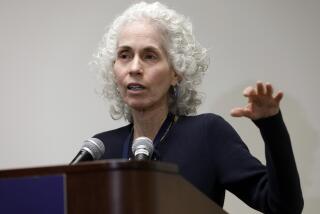Irvine Lawyer Goes for Gold by Collecting Unpaid Debts
- Share via
To most lawyers, debt collection is a lot like cleaning the garage: It’s a dirty job, but somebody has to do it.
The field is a high-volume practice that doesn’t pay anywhere near six-figure fees. Most cases are about as exciting as a past-due telephone bill. And those lawyers who do it would probably lose a popularity contest to an IRS auditor.
All that doesn’t bother Countess Pease Jeffries, an Irvine attorney with a bachelor’s degree in electrical engineering, a master’s in business administration and a law degree from Harvard.
Unlike many of her peers, Jeffries sees gold where others see grief.
“Every business has collection problems,” she explains, “so the possibility of clients is unlimited.”
Wins U.S. Contract
Jeffries, 42, soon should see an even bigger variety of cases. Her one-lawyer office, Jeffries Advocates, was recently chosen as one of four Southern California firms to collect debts for the U.S. government.
The firms--the other three are in the San Fernando Valley--were selected from a field of 18 bidders to collect $27.5 million worth of debt in a seven-county area of Southern California that the U.S. attorney’s office does not have the resources to pursue.
The new pilot project stems from the Debt Recovery Act of 1986, which allows the U.S. attorney general to contract with private firms.
If the program is successful, Southern California could eventually have 16 law firms pursuing debts from defaulted student loans, Small Business Administration disaster home loans, Department of Housing and Urban Development home loans and overpayments to military personnel and defense contractors.
For Jeffries, the one-year government contract, with renewal options, represents lots of steady work and a chance to expand her practice.
That’s saying something when you consider that--like many debt collection lawyers--Jeffries estimates that she already handles more than 500 cases.
Sitting behind a plain, white-painted desk in an office with a hand-lettered sign on the front door, Jeffries good-naturedly talks about why she focuses on creditors’ rights. Her office is fairly typical of many collection lawyers’, with a four-person support staff, a sparse library and none of the opulence typical of tonier practices.
She began emphasizing debt-collection work, she says, because she was representing clients in business matters who had problems getting paid. “All of a sudden, there was a big demand, and I did it.”
A friend and colleague, Los Angeles attorney Gerald T. Manpearl, has another view.
“In all areas of our society, it’s a difficult situation for women and blacks . . . in terms of attracting the quality of corporate clients that a white male with (Jeffries’) credentials would be able to attract,” Manpearl said. “Lawyers are like other business people in that they accept work where they can get it.”
Whatever the reason, Jeffries spends much of her time these days collecting overdue bills for bonding companies, commercial property managers, vehicle leasing companies and, of course, other lawyers.
“I’m part investigator, part negotiator, part attorney and part enforcer,” she said.
That means seeking repayment of debts ranging in size from $1,500 to $250,000.
The cases arrive after a client has already blitzed the debtor with phone calls and letters. “They don’t come to me unless there’s going to be a litigation dogfight,” Jeffries explains.
Like most collection lawyers, Jeffries typically encourages debtors to pay, explaining that it could cost them more to delay a bill. “We ring the bell and squeak the wheel, explaining (that) the new wallpaper can wait and that we want to be paid.” In full.
Works Out Plans
If that’s impossible, she can work out payment plans or discount the debt--providing, of course, that her client agrees.
When the debt is disputed or her letters are ignored, Jeffries can end up facing the debtor in court.
Ten years of learning the ropes--with at least six of those focusing on collection work--gave Jeffries experience that made her suited for the federal government’s program.
“She impressed us that her firm was qualified and had the capacity to handle the government’s volume of cases,” said Robert N. Ford, deputy attorney general for debt collection management in Washington.
So when Jeffries and the three other law firms submitted the lowest bids--saying they would perform the government’s work for 15% to 24.5% of what they collect--they won the contracts. Jeffries and the government declined to identify her specific bid.
The work will be something of a change in that Jeffries--like all four California firms--will be closely supervised by the government.
Still, she says, “I’m looking forward to it. We’re always looking for new business. . . . I just think it’s one more client that we have to keep happy.”
More to Read
Inside the business of entertainment
The Wide Shot brings you news, analysis and insights on everything from streaming wars to production — and what it all means for the future.
You may occasionally receive promotional content from the Los Angeles Times.









